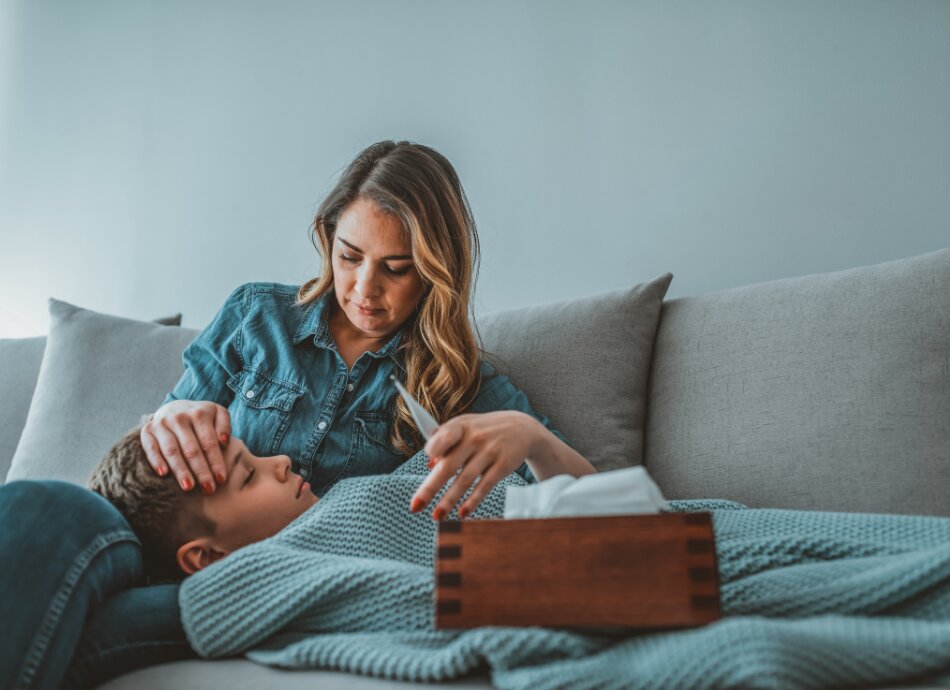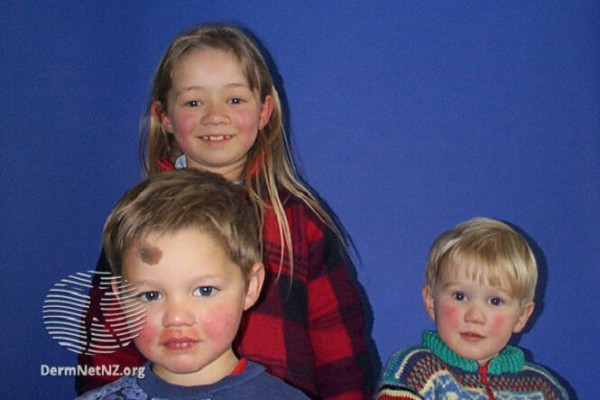Slapped cheek disease (parvovirus B19)
Also known as parvovirus B19, fifth disease or erythema infectiosum
Key points about slapped cheek disease
- Slapped cheek disease is a common infectious disease that mostly affects children.
- Symptoms of slapped cheek disease include cold-like symptoms followed by a rash on your cheeks that looks like a scald or the mark left by a slap.
- In healthy children, slapped cheek disease is mild and short-lived, but for pregnant women or children with reduced immunity or blood disorders, it can be more serious.
- You can usually look after someone at home without needing to visit your GP.
- Treatment focuses on easing your symptoms with self-care measures.
- There are things you can do to reduce the spread of slapped cheek disease.

Slapped cheek disease is caused by a human virus called parvovirus B19. The virus is passed on by an infected person, mainly through coughing or sneezing. Symptoms start from 4–20 days after you are infected with the virus.
You can pass the virus on to others from 5–6 days before symptoms start. Once the rash appears, you are no longer infectious.
Slapped cheek disease is most common during winter and spring. It spreads rapidly through schools because it is infectious before you have any symptoms.
Only a small number of adults get slapped cheek disease. Many adults are already immune because they had the virus in the past, maybe without realising. Your body produces antibodies to the virus which protects you from getting it more than once.
Very rarely, unborn babies can be infected through their mother’s blood during the first 20 weeks of pregnancy. This creates a small risk of miscarriage or your baby getting a type of anaemia (low iron levels in the blood).
The first few symptoms of slapped cheek disease are:
- feeling generally unwell (your child seems ‘off-colour’ or grizzly)
- fever
- headache
- cold-like symptoms such as a runny nose or sore throat
- tiredness
- muscle aches
- stomach upset
- diarrhoea.
The typical hot red rash on your child's cheeks then appears between days 3–7. The face rash lasts for 1–3 days and may be followed by a rash on their body, arms and legs that has a pink lace-like pattern. This rash may be itchy. The rash may fade, then come back again when your child is hot or upset. This can happen for 2–6 weeks.

Image credit: DermNetNZ
Adults who catch slapped cheek disease may not develop a rash, but have sore joints, particularly in your hands and feet. This generally lasts about 2 weeks, but sometimes lasts several months.
Some people who get infected do not have any symptoms or just feel generally unwell without any rashes.
Remember if you or your tamariki have flu symptoms, text for COVID-19.
Slapped cheek disease can usually be self-managed at home without a visit to your GP. However, there are some situations where you do need to see your doctor.
|
See your GP if you or your child experience any of the following: |
Call Healthline 0800 611 116 or Plunketline 0800 933 922 if you are unsure what to do. |
Your doctor will ask you questions about your symptoms and examine you or your child. Depending on what your doctor thinks is causing your symptoms, they may ask you to have some blood tests.
Slapped cheek disease can have serious complications for people with reduced immunity, eg, people undergoing chemotherapy or who have HIV/AIDS or blood disorders. Complications include bone marrow failure and a sudden inability to produce blood cells (aplastic crisis). These conditions are serious and need urgent medical attention.
In a very small number of cases, infection with the disease results in serious anaemia and miscarriage for babies whose mothers catch slapped cheek disease during the first 20 weeks of pregnancy.
Slapped cheek disease is usually a mild and short illness which gets better by itself. Treatment in otherwise healthy people focuses on easing your symptoms with self-care measures at home, including:
- getting lots of rest
- drinking plenty of fluids
- providing cool flannels for cheeks
- paracetamol for fever or aches.
Anyone with reduced immunity or blood disorders who catches slapped cheek disease should seek medical attention to monitor and treat potentially serious complications. If you are pregnant and have been in contact with someone with slapped cheek disease, consult your lead maternity carer (LMC) or your doctor.
Apps reviewed by Healthify
You may find it useful to look at some Self-management and healthy living apps.
Slapped cheek disease is often caught from people with no symptoms, so it is not easy to prevent it. By the time the rash appears you are no longer infectious. As long you feel well enough, you don't need to be away from school or work.
Instead, do these things to reduce the chance of catching or passing on slapped cheek disease:
- Stay at home if you have cold or flu symptoms.
- Cover all coughs and sneezes.
- Wash and dry your hands often and well.
- Don’t share food, eating utensils or drink bottles.
- Avoid anyone infected with slapped cheek disease if you are pregnant or have low immunity.
The following links provide further information about slapped cheek disease. Be aware that websites from other countries may have information that differs from New Zealand recommendations.
Slapped cheek(external link) Healthinfo Canterbury, NZ
Slapped cheek(external link) Plunket NZ
Slapped cheek disease(external link) Health New Zealand | Te Whatu Ora
Slapped cheek disease(external link) Better Health Channel, Australia
Slapped cheek syndrome(external link) NHS, UK
Apps
Self-management and healthy living apps
References
- Slapped cheek disease(external link) Health New Zealand | Te Whatu Ora
- Erythema infectiosum(external link) DermNet, NZ
- Slapped cheek disease (Fifth disease) – a patient’s guide(external link) Family Doctor, NZ
- Parvovirus infection(external link) Patient Info, UK
Credits: Healthify editorial team. Healthify is brought to you by Health Navigator Charitable Trust.
Reviewed by: Dr Alice Miller, FRNZCGP, Wellington
Last reviewed:
Page last updated:





